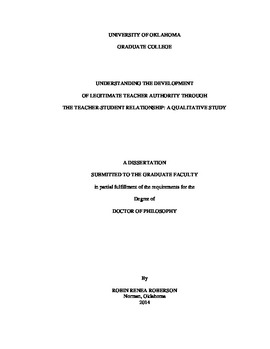| dc.description.abstract | Focusing on the relational elements of care, respect, and trust, this sequential qualitative study examined teacher authority development through the development of the teacher-student relationship. Teacher effectiveness was also investigated in relation to legitimate teacher authority and laissez-faire teacher authority. A model was produced which illustrates how teacher effectiveness is gained through the development of legitimate teacher authority via the teacher-student relationship. The model, which was originally based on current theory from the literature, was supported by the findings of the study. Study participants, who were from the same school district, included 20 anonymous high school English students and 15 teachers from across the district. Among the teachers were 13 females and two males whose ages ranged from 24 to 59 years; all were Caucasian. Data included essays on effective and ineffective teachers collected from the students, and observations and semi-structured interviews conducted with the teachers.
Student essays were used to create a teacher observation form which identified effective and ineffective teacher behaviors; this form was used to analyze the teacher observations and identify the most and least effective teachers. Observational and interview data were used to classify each teacher as either a legitimate or laissez-faire authority; these data were then analyzed to describe how legitimate teacher authority develops and how authority affects teacher effectiveness in the classroom.
Based on authority type, the teacher observation and interview data were analyzed to describe how those teachers classified as legitimate authorities develop authority as they interact with their students. Using multiple forms of consistent care and respect via their teacher-student relationships, these teachers develop trust with their students; trust which is embodied as student cooperation in the classroom. By cooperating with the teacher, students allow the teacher to have authority and legitimize it through continued cooperation. Teacher care included learning about students as individuals and meeting students’ needs. Teacher respect included: treating students as individuals, recognizing their worth, allowing them to have autonomy, and fairness in the treatment of students in relation to each other.
Based on both teacher effectiveness and teacher authority type, the teacher observation and interview data were analyzed to describe how teacher authority type affects teacher effectiveness in the classroom. The most effective teachers were found to be strong legitimate authorities while the least effective teachers were found to have either weak legitimate authority or laissez-faire authority. Students of the most effective teachers were the most cooperative and appeared to be self-regulated in the classroom. Students of the least effective teachers were the least cooperative; they regularly ignored or argued with the teacher, requiring the least effective teachers to exert their authority many times during their observations to gain student cooperation.
This study holds many theoretical implications. It provides a model describing the development of legitimate teacher authority and teacher effectiveness through the teacher-student relationship, adds to the literature on teacher socialization of students, and describes major differences between effective and ineffective teachers. This study holds practical implications for the training and evaluation of preservice and in-service teachers. It also holds practical implications for parenting in that it describes the development of legitimate authority from the perspectives of teens and adults. | en_US |
